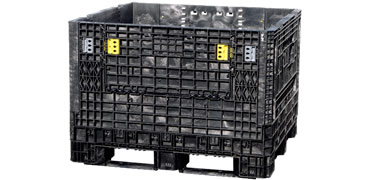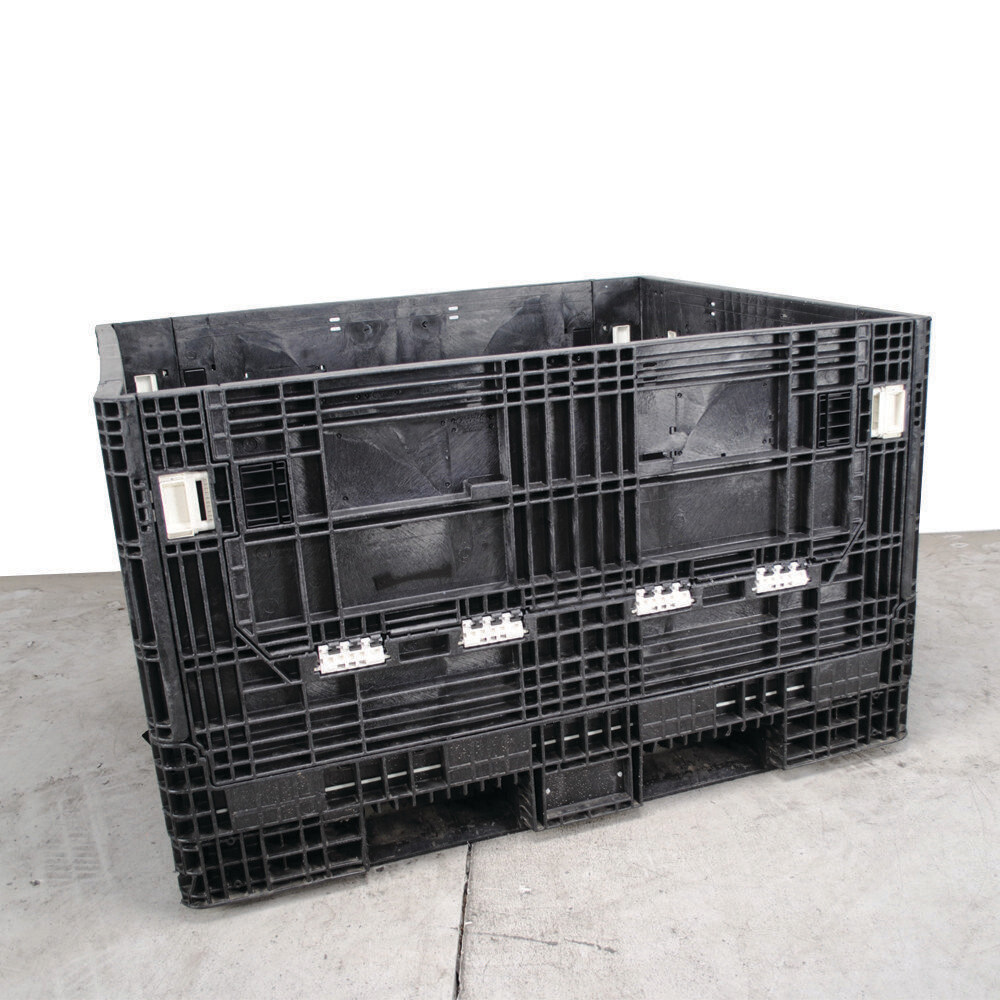The Ultimate Guide to Picking the Right Bulk Containers for Your Organization Demands
Choosing the ideal bulk containers is important for any kind of company that depends on effective logistics. Numerous sorts of containers exist, each created for certain products and applications. Aspects such as dimension, material compatibility, and regulative requirements play a significant function in this decision-making procedure. Recognizing these components can result in boosted operational effectiveness. Nonetheless, many organizations forget essential elements that can improve their overall performance and sustainability. What are these factors to consider?
Comprehending Different Kinds of Mass Containers
Bulk containers act as crucial tools for businesses seeking reliable storage space and transport options. These containers can be found in various types, each made to fulfill specific operational demands. One typical type is the intermediate bulk container (IBC), which is suitable for liquid and granulated materials, providing a balance of capacity and ability to move. One more preferred option is the bulk bag, or FIBC, appropriate for completely dry, flowable items. These versatile containers are lightweight and can be quickly delivered and kept. For larger materials, rigid mass containers are usually employed, offering longevity and stability for safe handling. In addition, there are specific containers tailored for dangerous materials, making certain conformity with security guidelines. Understanding the unique qualities of these mass container types allows companies to make enlightened choices that enhance logistics and decrease prices. By choosing the right container, companies can enhance their functional performance and enhance their supply chain processes.
Key Material Factors To Consider for Mass Containers
When picking bulk containers, it is necessary to ponder the materials used in their building and construction. Elements such as stamina, chemical, and resilience compatibility play a vital function in guaranteeing the containers meet particular operational needs. Additionally, weight and mobility problems can influence both efficiency and transport logistics.
Product Durability and Strength
Longevity and toughness are essential consider choosing products for mass containers, as they straight influence the container's capability to hold up against different ecological conditions and taking care of procedures. Products such as high-density polyethylene (HDPE), polypropylene, and stainless steel are generally preferred for their robust properties, supplying resistance to temperature, abrasion, and influence fluctuations. The selection of material also affects the general life-span of the container; stronger materials usually cause much less constant substitutes, causing set you back savings gradually. In addition, the weight of the material can affect delivery expenses and convenience of handling. Businesses need to consider their particular functional settings and the capacity for deterioration to assure peak resilience and stamina in their bulk container choice.
Chemical Compatibility Factors
Comprehending chemical compatibility is vital for picking bulk containers, as the materials utilized have to withstand the particular compounds they will hold. Numerous variables affect compatibility, consisting of the chemical nature of the materials, temperature level, and period of storage space. Destructive chemicals might call for containers made from stainless steel or specialized plastics that withstand destruction. In addition, responsive materials can generate warm or gases, requiring vented or pressure-rated containers. The option of container material, whether polyethylene, polycarbonate, or metal, need to straighten with the chemical residential or commercial properties of the saved substances to avoid leaks or breaches. Ultimately, an extensive analysis of these compatibility elements assures risk-free handling and storage, protecting both employees and the setting while preserving product honesty.
Weight and Mobility Issues
Selecting bulk containers includes not just assessing chemical compatibility but additionally thinking about weight and portability. Companies need to assess the convenience of handling and transport to optimize efficiency. Lightweight materials like high-density polyethylene (HDPE) or light weight aluminum can assist in much easier motion and reduce delivery expenses. On the other hand, heavier containers might supply boosted toughness however can impede flexibility, particularly in settings calling for constant moving. In addition, the style of the container need to enable practical training and stacking, ensuring ergonomic security for workers. Companies ought to also think about the framework available for transport; for instance, containers compatible with forklifts or pallet jacks can streamline procedures. Inevitably, the ideal equilibrium in between weight and mobility directly affects operational effectiveness and cost effectiveness.
Sizing Your Bulk Containers for Ideal Performance
When sizing bulk containers, services need to thoroughly evaluate the measurements called for to accommodate their certain products. In addition, weight capability is a critical aspect that affects performance and security throughout transport and storage. Reliable sizing not just takes full advantage of area however additionally optimizes operational process.
Figuring Out Container Capacities
Selecting the appropriate dimensions for bulk containers is essential for maximizing effectiveness in storage space and transportation. Organizations have to examine their details demands, taking into consideration factors such as available room, the nature of the goods being kept, and the techniques of transport used. Accurate dimensions assure that containers fit preferably in stockrooms and automobiles, reducing wasted space and reducing dealing with time. Requirement dimensions can offer benefit, but personalized measurements could be needed for one-of-a-kind demands or to accommodate particular items. Additionally, it is very important to examine stacking abilities and access, as these elements affect overall operational performance. Inevitably, the appropriate measurements lead to boosted organization and streamlined logistics, profiting the general productivity of the service.
Weight Ability Considerations
Recognizing weight capability is crucial for services aiming to enhance their bulk container performance. The weight ability of a container pop over to these guys straight affects storage capabilities, transportation logistics, and overall operational prices. Choosing containers with the proper weight restrictions guarantees that companies can securely keep and transfer their goods without taking the chance of damage or compliance concerns. Straining containers can bring about architectural failings, while underutilizing capacity cause squandered sources. It is vital for businesses to examine their product weights and consider any type of regulatory needs when selecting containers. Furthermore, variables such as the kind of material, intended use, and environmental conditions ought to likewise influence weight capacity choices. By evaluating these aspects, businesses can improve performance and assure a streamlined supply chain.
Regulative Conformity and Security Standards

Governing conformity and safety standards play an important duty in the option of bulk containers for businesses. Organizations needs to ensure that their containers satisfy numerous laws established by neighborhood, nationwide, and worldwide authorities. These criteria often concern product security, structural integrity, and appropriate labeling, which assist protect against crashes and guarantee the risk-free transport of products.
In addition, adherence to industry-specific standards, such as those from the Food and Drug Administration (FDA) or the Occupational Security and Wellness Management (OSHA), is critical for business handling harmful materials or foodstuff. Non-compliance can result in fines, legal concerns, or damage to a service's online reputation.
Organizations must also consider the container's compatibility with the materials being saved or transported to avoid contamination or chemical responses (refurbished bulk containers). To sum up, understanding and applying regulative conformity and safety requirements is essential for the efficient and liable usage of mass containers
Sustainability Alternatives for Eco-Friendly Bulk Containers

Companies are likewise discovering alternatives made from recycled materials, which not just conserve sources however additionally sustain the recycling industry. Furthermore, developments in style enable lighter containers that require less energy to transportation, additionally enhancing sustainability. By integrating these eco-friendly bulk container alternatives, services can show their commitment to environmental stewardship while meeting consumer demand Extra resources for sustainable practices. This change not just helps the planet however can additionally improve brand reputation and client loyalty.
Cost-Effectiveness and Budgeting for Bulk Containers
While numerous services concentrate on sustainability, cost-effectiveness stays a crucial variable when selecting bulk containers. Organizations needs to analyze the preliminary purchase rate, in addition to lasting functional expenses, to ensure monetary viability. Aspects such as resilience, reusability, and maintenance play a substantial duty in identifying overall expenditures.
Buying premium containers might produce greater ahead of time costs however can bring about financial savings through lowered substitute prices and reduced waste. Furthermore, organizations must consider transport costs and storage space effectiveness, as these can influence the total spending plan.

Often Asked Questions
Exactly how Do I Establish the Right Container for Hazardous Products?
To figure out the right container for harmful products, one have to review compatibility with the compound, take into consideration the container's product, check for governing conformity, and examine ability and safety attributes to assure correct handling and storage space.
Can Mass Containers Be Personalized for Details Products?
Yes, bulk containers can be customized for certain products. used plastic containers. Numerous functions, such as layout, product, and size, can be customized to meet one-of-a-kind requirements, ensuring suitable safety and effectiveness for moving and keeping different goods
What Is the Ordinary Life-span of Different Bulk Container Kind?
The average lifespan of mass container types differs; plastic containers last 5-10 years, steel containers 10-20 years, and wooden containers typically last 3-7 years, relying on use, upkeep, and environmental problems.
Just how Should I Tidy and Maintain Bulk Containers?
To cleanse and maintain bulk containers, one need to regularly inspect for damages, eliminate residue, clean with proper detergents, rinse thoroughly, and assurance appropriate drying prior to storage. Complying with supplier standards boosts long life and safety and security throughout usage.
Are There Rental Options for Mass Containers Available?
Yes, many companies offer rental alternatives for bulk containers, offering versatility for companies. These leasings can suit various requirements, enabling firms to handle stock effectively without the commitment of acquiring containers outright.
Durability and toughness are critical elements in choosing products for bulk containers, as they straight influence the container's ability to stand up to different ecological conditions and handling procedures. Recognizing chemical compatibility is vital for selecting bulk containers, as the materials utilized must resist the particular materials they will certainly hold. Understanding weight capability is important for services intending to optimize their mass container efficiency. Regulatory compliance and safety requirements play an essential duty in the choice of bulk containers for services. While many organizations concentrate on sustainability, cost-effectiveness remains a crucial variable when selecting mass containers.